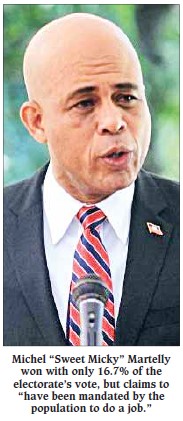|
 On a continent which has been
moving away from U.S. imperial
dominance, Colombia’s President
Alvaro Uribe was an exception. On a continent which has been
moving away from U.S. imperial
dominance, Colombia’s President
Alvaro Uribe was an exception.
In stark opposition to defiant leaders like Venezuela's Hugo
Chavez, Bolivia's Evo Morales,
and Ecuador's Rafael Correa, Uribe
emerged as Washington’s closest
ally in Latin America, making Colombia
the main U.S. beach-head
on the continent. Washington still
plans to build seven new military
bases there. During his eight-year term,
Uribe became an iconic U.S. confederate.
Latin American popular slang
began to call a pro-U.S. leader “a
Uribe.” That is what some are now
calling Haiti’s new likely Presidentelect,
Michel Martelly.
Martelly’s Apr. 5 press conference,
his fi rst since preliminary
results showed him to be the Mar.
20 second-round winner, seemed to
justify this moniker. “We have the
development plan of Colombia,”
Martelly said. “A week ago, I met
with the Colombian Foreign Minister.
I would say that this meeting
was friendly.” Uribe stepped down in August
2010, but only to pass power to a
man who has been described as his
“shadow”: Juan Manuel Santos. The
Santos government’s development
plan is “committed to deepening the
reforms—many of which were put
in place by Mr. Uribe—that have
made Colombia one of the most
business-friendly countries in Latin
America,” reports The Economist. In
short, Colombia’s new Development
Plan is familiar, old neo-liberalism.
Judging from his campaign remarks,
Martelly’s regime will look a
lot like Santos’. The Plaid Avenger
blogger sums up Santos as “conservative
right, pro-military, pro-police,
pro-security,” as “essentially
continuing all of the policies of
... Alvaro Uribe,” as “pro-US, and
trade/aid ties will likely expand in
his tenure,” while concluding that
“Santos does not get along well
with the leftist leaders of his neighborhood;
Venezuela and Ecuador.”
If Martelly is “a Uribe” or “a
Santos,” it could spell trouble for
various cooperation agreements
Haiti has with Venezuela and Cuba,
that were initiated by the governments
of current President René
Préval and former President Jean-
Bertrand Aristide. These agreements
include the deployment throughout
Haiti of hundreds of Cuban and Cuban-
trained doctors and other medical
personnel, training of Haitian
medical students at Cuban schools,
Cuba’s modernization and support
for a major sugar mill, and Venezuela’s
building and modernization of
new power stations and the Cap Haïtien airport.
As if on cue, Haitians began
noticing the deployment of U.S. soldiers
around Haiti in the days leading
up to Apr. 4, when the results
of the U.S.-sponsored and directed
elections were announced. Then, after
the deployment, the U.S. Embassy
announced “the recent arrival of
the fi rst soldiers of Task Force Bon
Voizen, deployed as part of the humanitarian
mission New Horizons
2011.” (Fittingly, the Embassy misspelled
the Kreyòl term, Bon Vwazen,
meaning “good neighbor.”) The Embassy said that “these
humanitarian soldiers... will be in
the area of Cité Soleil and Saint
Marc to make the logistical preparations
before going to their base
in Mandrin, in the Artibonite Department.”
Meanwhile, in his press conference,
Martelly asserted that the
UN military occupation known as
MINUSTAH “will continue to accompany
us in providing security.” Martelly claimed that “it was
us, the Haitian people, who made
this victory by voting 67.57%”
for him. In reality, no more than
16.7% of Haiti’s electorate voted
for Martelly because a grassroots
boycott of the election was effective,
combined with generalized
voter disgust and alienation about
the flawed and non-inclusive election.
Over 75% of Haitian voters
abstained. Thus, his words rang hollow
when Martelly asserted that “we
have been mandated by the population
to do a job.” And what is
that job?
“To change our political practices,
our political choices, and our
social organization,” Martelly said.
Given his record, such pronouncements
are ominous. As
Time’s Tim Padgett noted, “many
of Martelly’s supporters are (...)
too young to remember the early
1990s, when he was an avid supporter
of a brutal military coup
that overthrew a democratically
elected President. It was also a
period when Martelly seemed to
have formed the almost megalomaniacal
self-image that has
many wondering if Haiti has
picked a reliable democrat or a
reckless demagogue to oversee
the reconstruction of the western
hemisphere’s poorest country.” Many Haitians would respond
that they did not “pick” Martelly. He is being installed,
they would argue, through an illegal
U.S.-sponsored “selection.”
This is why many expect him not
to be a courageous leader of the
Haitian people, but rather Washington’s
lackey, “a Uribe.” |